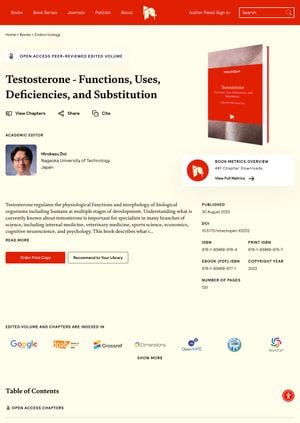TLDR Testosterone is important for male development and health, and careful replacement can treat low levels.
The document "Testosterone - Functions, Uses, Deficiencies, and Substitution" discusses the role of testosterone as the primary male sex hormone. It is responsible for the development of male reproductive tissues, the promotion of secondary sexual characteristics, and the maintenance of muscle mass and bone density. The paper also explores the uses of testosterone in medical treatments, particularly in hormone replacement therapy for individuals with low testosterone levels. Deficiencies in testosterone can lead to conditions such as hypogonadism and certain types of alopecia. The document also discusses the potential for testosterone substitution in treating these deficiencies, though it notes that this approach should be used with caution due to potential side effects.
 25 citations
,
March 2000 in “Journal of Endocrinological Investigation”
25 citations
,
March 2000 in “Journal of Endocrinological Investigation” Testosterone therapy aims to treat hormone deficiencies and various conditions safely and effectively, but requires careful patient monitoring due to potential side effects.
 14 citations
,
December 1998 in “The Journal of Clinical Endocrinology and Metabolism”
14 citations
,
December 1998 in “The Journal of Clinical Endocrinology and Metabolism” MENT could be a better option than testosterone for male hormone therapy and birth control because it works well at lower doses and has fewer side effects on the prostate.
 3 citations
,
January 2016 in “Elsevier eBooks”
3 citations
,
January 2016 in “Elsevier eBooks” Steroid hormones are crucial for body functions and have various medical uses, but their misuse can lead to dependence.
 20 citations
,
January 2003 in “Treatments in Endocrinology”
20 citations
,
January 2003 in “Treatments in Endocrinology” Testosterone therapy can help improve mood, sexual function, and bone health in women with low androgen levels, but more research is needed to establish safe and effective guidelines.
 34 citations
,
December 2012 in “Current Opinion in Clinical Nutrition and Metabolic Care”
34 citations
,
December 2012 in “Current Opinion in Clinical Nutrition and Metabolic Care” Sex hormone treatments can increase muscle mass in older adults but have inconsistent effects on muscle function and may carry cardiovascular risks.





